From sponsored child to PhD student: Pauline's story
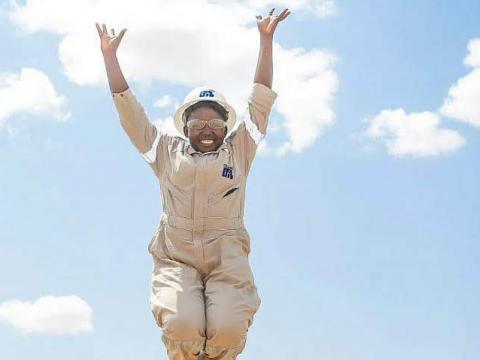
How did Pauline Lokidor go from being a sponsored girl in rural Kenya to bringing clean water to her village? This is her story.
I am a well-trained Turkana woman. I can make traditional huts, cook the traditional fried meat, milk a goat, cow and camel. I was well-trained to be a Turkana wife. So why am I writing this at my desk in Coventry?
Well, I feel lucky and blessed in equal measure, all the way from Morulem village to England … in pursuit of my academic dreams.
But it’s not all about luck. They say hard work and resilience can bring you close to achieving your dreams, something I can sincerely vouch for.
A difficult start
I grew up in Morulem village, in Turkana county, Kenya. The village is well-known for its spectacular acacia tree cover and shade, but wait until you step onto its spikes! As a kid, I never enjoyed being sent at night to buy or collect something. In my imagination, the tree trunks resembled people hiding in the dark.
I hail from a humble nomadic family of six siblings: three girls and three boys. I am the only one who has risen to this height education-wise. Our own family home is centrally placed with acacia trees to the right and left and a view of the hill to the south-east and a nice view of the sunrise every morning.
Turkana county, located in the north-western part of Kenya, is one of the arid and semi-arid regions of Kenya. It’s characterised by an extremely dry climate (also known as a high aridity index), devastating and severe droughts. And the nomadic communities there are marginalised, with a poor standard of living (99% of the population live on under one dollar a day), high illiteracy levels, and limited opportunities.
In addition, the county is undeveloped compared with other parts of the country, suffering from water scarcity and dire insecurity issues that have cost so many lives. I have lost close family, friends and in-laws through this.
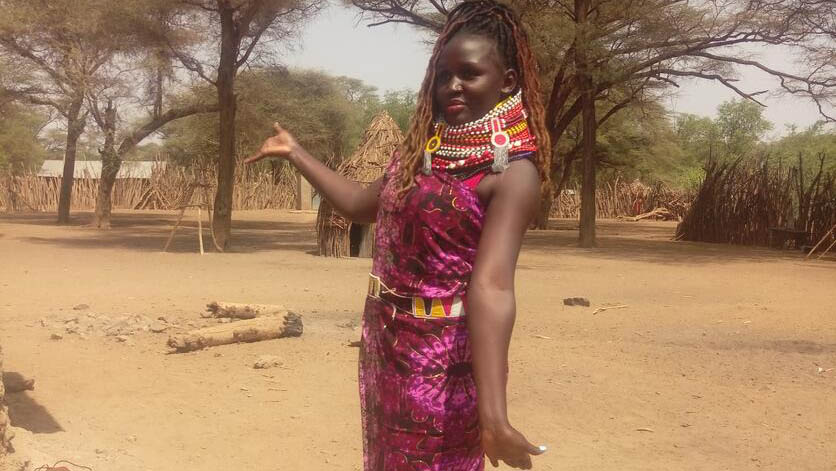
Water, health & education
The main water sources in places like my village are hand pumps and shallow wells. The water quality breaches World Health Organisation Standards of Potable water. But since the options are limited, people use the water for domestic and livestock, thus increasing their susceptibility to water borne diseases and fluorosis, which is very common in Turkana. High fluoride levels, occurring naturally in the water, cause teeth discolouration (intrinsic stains) and knee problems. I am a victim too.
Schools are understaffed and less equipped – especially in remote areas. Children often have to walk more than 2 kilometres to and from school on foot. It’s exhausting and discourages many from starting and completing their primary level studies.
Girls’ rights?
Nomadism is the dominant culture in Turkana county. Men are empowered with all the decision-making while women are voiceless and obliged to be submissive. Girls are regularly denied their right to an education as it’s not considered important. While the situation is gradually shifting as communities are more familiar with gender equality, real change will take some time.
Girls in a family are measures and sources of wealth. In their early teens, they are subjected to harsh and cruel cultural practices in the name of training to be better housewives. You might have an idea of this if you’ve seen the two ladies who were to be married to the Princes of Zamunda Kingdom in the movies Coming to America 1 & 2.
Men are empowered with all the decision-making while women are voiceless and obliged to be submissive.
As I write this, I am a well-trained Turkana woman. I know how to make traditional huts, slaughter a goat or lamb and cook the traditional fried meat Ngamormoru and Enyas. Besides, I know how to milk a goat, cow and camel, and I’m excellent in making the beaded traditional regalia. See… I am very competent in my culture.
The arithmetic of a Turkana girl
I’m not passionate about numbers – I did not want to get a permanent brain injury by taking serious Mathematics courses like accounting or economics – but I can explain the arithmetic behind a Turkana girl. It is like savings deposited in a bank for 14-17 years, plus regular deposits (training to be a housewife) and a final withdrawal when the girl is given to her husband. But I was determined not to follow the usual equation.
Raised as the oldest girl in a nomadic family, I did all the house chores and herding during my early childhood. Being a female, I was frequently harassed by male herders. This experience strengthened me and I developed a bold attitude to face challenges head on.
I used to multi-task, splitting my time between school, fetching water from the one hand pump located 4-5 kilometres from the village (at least 2- 3 times a day, fetching 10-20 litres per trip) and taking livestock to the grazing field.
Today, half the village has a piped water system, but as a kid it was very tricky and disappointing to fetch the water from the hand pump. I remember waiting for long hours as those with strong muscles and energy paced past us, while we had to wait sometimes till late. Monday to Thursday I was in school and Friday to Saturday (and sometimes Sunday) I would take our goats to the grazing fields more than 10 kilometres from the village, feeling very insecure to be honest. You may wonder how a child manages this? I simply trekked at the goat’s speed to and fro.
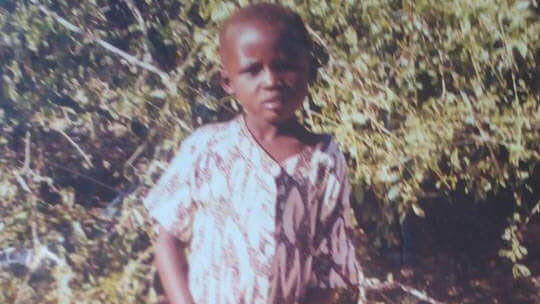
The cost of education
My class teacher used to flog me for missing classes on Fridays until I struck a good deal with her. I proposed fetching water for her or sometimes I stole a cup of camel’s milk for her to replace flogging. It worked perfectly. That is how brilliant my younger self was.
I am very proud of that brave and decisive girl right now. In everything I do, always I do it exceptionally. When herding, I never lost a single goat or sheep despite being in charge of thousands of them and mixing along the way with the neighbours. My childhood was turbulent, but I learnt many hard – and useful - lessons. Not the least, I learned hard work, resilience and the benefits of multi-tasking. But I always remember, I’m a girl from a nomadic community; I have to work extra hard in my studies to prove my worth.
I wish I could say thank you to my sponsor for playing a pivotal part in my life.
My father enrolled me in school to undertake my primary education. His intention was for me to learn to write my name, while mine was to get free food. Food was scarce too, and getting a free meal was a privilege. As there weren’t enough schools in the region, my school was almost three kilometres away, on the other side of the hill. I had to brace myself for climbing the hill daily to and from school. My sandals got worn out and many a time I would go to school bare foot.
Constant encouragement from my mother and the desire to at least get something for my hungry stomach, were my motivations. Very early in the morning you could see me in a company of other children dressed in baby pink shirts and navy-blue skirts climbing the hill that gives the village its name. We’d each be carrying five litres of water or a piece of firewood as our contributions towards preparing our school lunch.
Before free primary education was introduced in Kenya, the majority of the parents could not afford to pay school fees, including my dad. Luckily, after two years, primary education was free but it was the parents’ duty to provide their children’s uniforms and equipment. For most parents this was unaffordable and simply another barrier, preventing children from getting an education.
Fortunately, World Vision sponsorship clocked in around the same time, perfect timing. Their mission was to encourage and sustain children from the arid regions of Kenya in schools through an Area Development Programme. Isn’t that being blessed and lucky?
Child Sponsorship relieved a great burden from many parents. I got free school uniforms, books, mosquito nets and boxes, throughout primary level. Some of my friends received gifts, clothes and pictures of their sponsors from abroad but I never received any of these. Nevertheless, I wish I could say thank you to him or her for playing a pivotal part in my life.
Barriers to learning
I got diagnosed with asthma at a young age and could not fit in the community again. I was ridiculed and insulted by classmates – and even some of my neighbours – as it was considered a curse. My parents could not afford the required treatment and medication. World Vision Kenya come to my rescue and facilitated my medical treatment from 2003 to 2007.
Then, that same year, we lost all our pride (livestock) and we went to zero – very poor. This meant, after class 8 (the end of primary school), the probability of joining secondary school and continuing to higher education was also zero.
My elder brother was fortunate because he was finishing high school by then. At the start of every school year, animals were slaughtered to raise his school fees. But my second brother, who oversaw the livestock, had never stepped foot in a classroom. Now, he came back home and had nothing to do. The next victims were my younger siblings and me. I am sure if there were any resources left anywhere, they would have been diverted to allow my elder brother to finish college. Perhaps, being a male and a firstborn granted him more favours.
This was a turning point in my studies
I was already very bright and hardworking but after the loss of our animal, dropping out was imminent if I didn’t work extra hard on my studies. Finally, when the national examination results were released, I emerged among the top performers and secured admission into one of the top prestigious schools in the country, in Nakuru county.
I was super happy and excited. For the first time, I was going to study out of Turkana county to experience life in a new place. Unfortunately, my excitement was short lived due to financial constraints.
“Just look at our current situation, we hardly afford even that one meal a day, how can I afford the school requirements, leave alone the school fees. Plus, your condition; we don’t know when your next attack will be”.
These were my dad’s words. I don’t blame him; he was absolutely right.
I was left with two options: join the nearby under-performing district secondary school or repeat class 8. I resorted to a district school, but the situation worsened as my parents could not raise the fee for this school either. I almost dropped out of school.
Sustained by friendship
I was determined to find a way to secondary school. Through my curiosity, I secured local bursary funding. Constituency Development Funds (CDF) and local NGOs, such as World Vision, also came to my aid. My secondary schooling was motivated by one goal; to excel and gain government admission to the university – so my parents wouldn’t have to struggle with fees again.
When the school had first opened in the 1980s, there was a spike of good performance. My determination repeated this feat. But, as a boarding school, my upkeep was solely reliant on friends. Being top student in my class always got my sanitary towels and laundry requirements sorted. I got these as gifts – and it motivated me to work even harder.
At the beginning and closing of each term, I walked 10 kilometres to school from my village with just my bag and books, while most of the students from well-off families carried their heavy boxes full of shopping.
I stopped comparing myself with any of them as my story is different, and I embraced it.
During visiting days, my expectations were always as low as possible, while the rest of the students were excited to receive good food and shopping. My mum always came to see me with sometimes three litres of fermented milk, which I appreciate even now. After all, this is what they had. I was ever happy to see her.
Pocket money was a myth to me. When I was lucky, my dad could borrow 500 Ksh (which is less than $5) for me for the whole term. Just imagine, what can 500 Ksh buy for a female student?
Now… let the brilliant Pauline do the trading! I could trade a cup of fermented milk for a slice of bread, fruit or anything else that friends got from their parents. My best friends donated some of the shopping to me as they understood my situation. Reflecting, I don’t see any other way I'd have made it without World Vision and CDF support. I am forever grateful.
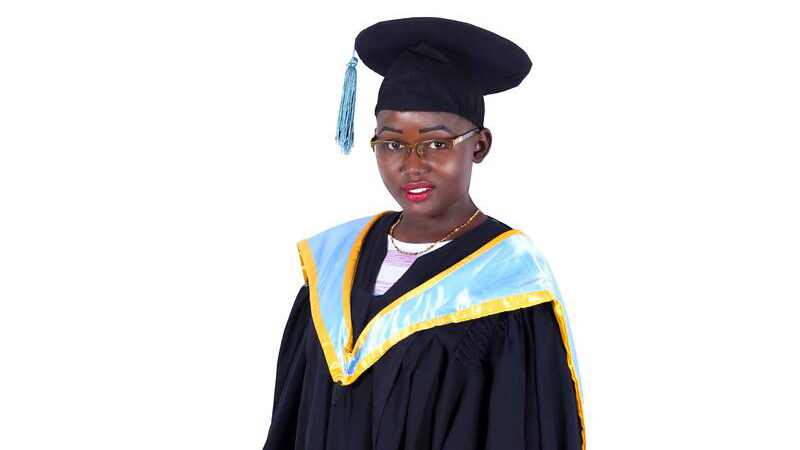
A thirst for study
My commitment paid off, as I successfully secured admission to university for undergraduate studies. Under government direct entry (financed by a loan from the Government of Kenya), my hard-founded goal to pursue a BSc course in Hydrology and Water Resources Management was realised at South Eastern Kenya University.
I chose a water-related course as I had my village’s water situation on my mind, particularly the women and children who are the most affected by the crisis and perhaps even saving the future life of a girl or woman from this daunting struggle. I wanted and (still do) to change the narrative in Turkana in my small way.
Stepping out of Turkana for the first time and travelling through the Kenyan’s bigger towns like Nakuru, Eldoret and Nairobi on my way to university was beautiful. A lot happened when I was doing my bachelor’s degree. Since I was receiving a government loan, I took the decision to support my younger siblings with what remained after my school fees. It wasn’t easy, to be honest. My upkeep money was never enough to pay for their school fees once my younger brother joined secondary school.
I had to look for extra income. So, I utilised my skills in bead art. I started making beaded belts, earrings, beaded wrist bands for sale (for lecturers and students), necklaces, hair plaiting, and even tried modelling to generate more money to boost my siblings. I multi-tasked a lot to save my younger siblings from going through what I experienced. My constant fear was that they might not be as strong as I am to look after themselves. These activities were time-consuming and I had to make time for studies.
In the end, I got Second Class Honours (lower division). I was disappointed that I didn’t do better, but my siblings who I sacrificed my time for, were all progressing well. One had managed to join college to pursue a certificate course in land survey (something I could afford to finance at that time), while my younger sister had joined high school, and my youngest sister was approaching the end of primary school. My struggle paid off.
Mastering scholarships
After graduation, I secured an internship opportunity with Tullow oil company to keep up with my responsibilities. While in Tullow, I had a burning spirit of extending my studies by doing a master’s degree, but I was discouraged by my 2:2. Many institutions and scholarships preferred 2:1 and above. I felt like I failed myself, but one day, I decided to give it a try. I applied for water-related MSc courses at seven different universities worldwide to see if they could accept me. To my surprise, I got admission to four of them. I was thrilled.
Securing funding to go was no joke though. I spent late nights in my office sending applications on top of my internship duties at Tullow oil company. If you have ever made an application, you can probably remember those long 2000-4000 word essays and describing yourself in motivational letters. I applied for several different scholarships. Regret emails came back almost from all.
Nevertheless, I never got discouraged; I kept applying for bursaries and grants in those four specific universities. I’m well built with sound shock absorbers for any setbacks. I was determined to get funding for one of them.
In April 2019, I got an email from Marshal Papworth with good news. I was nominated for their scholarship in partnership with Cranfield University, though my field was different from their sponsorship line (agricultural-related courses). I was required to send my documents by post to the UK – but I didn’t have money for the postage. It was frustrating, and I was desperately looking for help. I had already exhausted my limits to support my siblings’ education, and I couldn’t borrow any more.
I shared my dilemma with my field supervisor, and he covered all the postage charges. Thanks a million, Christopher Masafu.
I was awarded a partial scholarship. The same week, I was awarded Silsoe college and Cranfield school of Water Bursary grants. The three combined cleared my tuition fees while the also scholarship offered a stipend allowance. But would need more to meet the minimum UK Visa and immigration requirements. This was close to impossible. I created a fundraising group where my friends, colleagues and their extended friends contributed for me. I made several calls to my local leaders begging for their support and finally settled ticket and visa fees. Moral support from my parents kept me going too.
My thirst was to explore and build well-grounded expertise in water and the environment to help my county. Turkana has excellent potential compared to Israel, a similarly arid region with fascinating innovative solutions to water problems, but skilled experts and vast technology in the industry are still rare. I completed my MSc in Environmental Water Management at Cranfield University with a 2:1 grade.
While doing my MSc, I worked part-time (every weekend) to support my siblings and my family. My friends always get surprised when I say I am the breadwinner for my family. This is true. I am carrying all the responsibilities from providing food for my elderly parents, my brother who lives with epilepsy, my younger brother who is now enrolled on a diploma course, two sisters (one joined college recently and the other nearing the end of secondary education. This is part of my motivation because I want to be their role model and encourage them to keep working hard.
I remember I started working a part-time night job in Banbury, while I was based in Bedford. I spent all my weekends earning extra cash. I never minded the distance because I am used to it, never complained of anything. But I was keen on avoiding the mistake I made with my undergraduate degree. At the same time, I was applying for a funded PhD.
I applied for four different PhD courses and received three interview invitations. Isn’t that good news? Around the same time, I was doing my dissertation, and all I could do was balance my time so I could prepare for the interviews. All my days and nights were occupied. I felt delighted when I was accepted.
I would advise young girls in my nomadic communities to never give up no matter the challenges they go through. As there is always a light at the end of the tunnel.
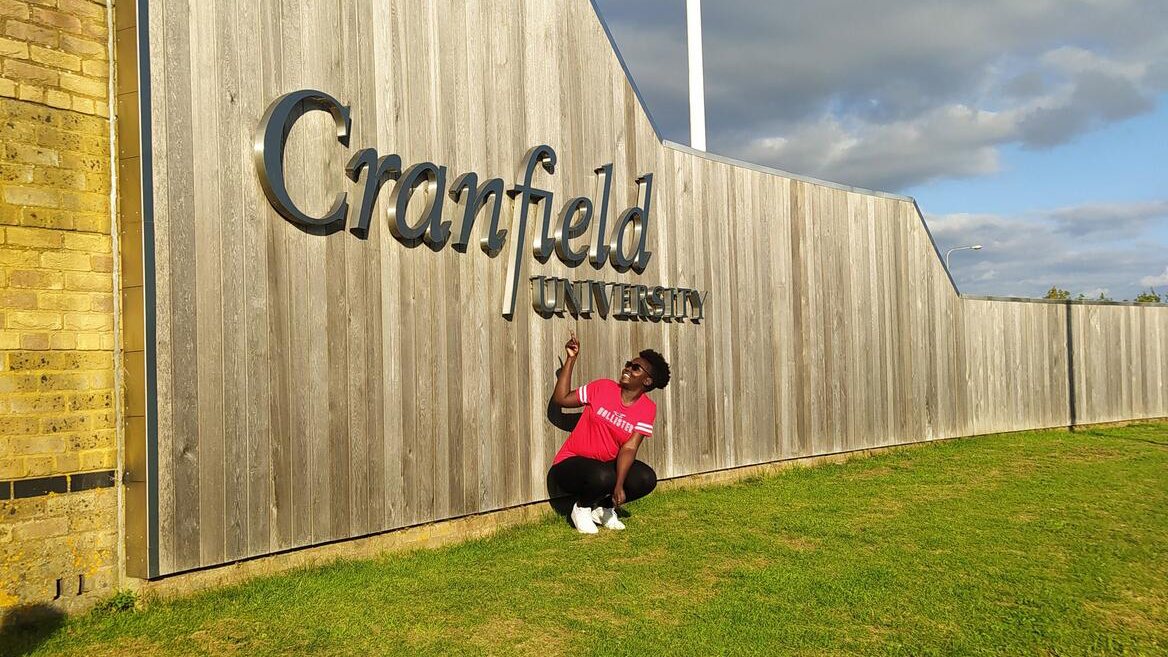
Bright future ahead
Indeed, obstacles are the stepping stones to success.
I am currently doing my PhD research programme in flooding and erosion control in informal settlements using Nature-Based Solutions at Coventry University. I’m so passionate and thank God for it. As I speak, I could be the first female ever from my village/ county, at my age, who has come this far in terms of education and pursuing a STEM (Science, Technology, Engineering and Mathematics) discipline.
I believe that there is a bright future ahead, not only for me but also for my community and country. I have bigger dreams of tapping the potential in Turkana, collaborating with the Turkana County Government and existing NGO’s who are already doing tremendous work in the region in terms of increasing water availability and building sustainable solutions to the water problem.
Further, I would like to be an inspiration and motivation to all the girls from nomadic communities to pursue their dreams. The struggle is real. Obstacles are temporal, but how to overcome them all depend on you. Your strength is within you.
I would advise young girls in my nomadic communities to never give up no matter the challenges they go through. As there is always a light at the end of the tunnel.
I am forever grateful to World Vision for being a stepping stone in my academic life. Thanks to Marshal Papworth, Cranfield University and Coventry University for believing in my potential. I take pride in my hard work, resilience, curiosity and perseverance. Despite my upbringing, challenges and impediments, I kept my head up, faced and embraced my challenges because I know where I have come from and where I am destined to reach.
And to those who are more privileged, do not judge another on any ground without knowing our background. We are different, we have our own stories of fortune and hard work, but we are all capable of achieving more.
*All photographs courtesy of Pauline Lokidor